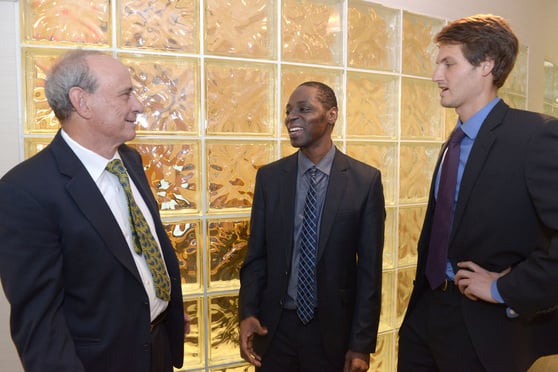Defense Lawyers Fault Queens DA Practice to Isolate Trial Prosecutors, but Judges Question Misconduct Claim
At oral arguments on Thursday for a lawsuit filed against New York City by a man who spent 14 years in prison for a murder he says he didn't commit, judges questioned claims that the case highlights a larger pattern of prosecutorial misconduct within the Queens District Attorney's Office.
April 26, 2018 at 06:55 PM
5 minute read
 File photo of Kareem Bellamy, center, with his attorney Thomas Hoffman, left, and Jonathan Hiles. Photo Credit: Rick Kopstein/ALM
File photo of Kareem Bellamy, center, with his attorney Thomas Hoffman, left, and Jonathan Hiles. Photo Credit: Rick Kopstein/ALM At oral arguments on Thursday for a lawsuit filed against New York City by a man who spent 14 years in prison for a murder he says he didn't commit, judges questioned claims that the case highlights a larger pattern of prosecutorial misconduct within the Queens District Attorney's Office.
The appeal by Kareem Bellamy, who was convicted of second-degree murder in the 1994 stabbing death of James Abbott in the Rockaway section of Queens, centers around the Queens DA's practice in which certain information is not disclosed to trial prosecutors, which defense attorneys say is a sort of “don't ask, don't tell policy” that protects trial prosecutors from potential Brady violations. The practice is said to construct a “wall” between trial lawyers and others who may have access to material that must be handed over under law to the defense.
In Bellamy's case, he alleged, the office did not disclose that it was paying relocation benefits for witnesses in his case.
“There was a tolerance in the office where there was a concentration on winning and there was a lack of concern with violations of constitutional rights,” said Joel Rudin of the Law Offices of Joel B. Rudin, who represents Bellamy, to a panel of the U.S. Court of Appeals for the Second Circuit.
But judges questioned the argument that Bellamy's attorneys weren't told that a witness in Bellamy's case received benefits and whether or not the payment of benefits affected what the witness told the investigators.
“I'm not sure we're looking at this horrible Brady violation by the prosecution that becomes an instrument for generally reforming the way in which this DA's Office conducts its business,” said Judge Dennis Jacobs.
Jacobs was joined on the panel by Judge John Walker Jr. and, sitting by designation, U.S. District Judge Michael Shea of the District of Connecticut.
The city maintains that Bellamy received a fair trial prior to his conviction and, with respect to Bellamy's Monell claims regarding the Queens DA's practice, it argues that Bellamy failed to prove that his constitutional rights were violated and that the city has no control over a DA office's alleged policy choices.
Bellamy is appealing a ruling by U.S. District Judge Ann Donnelly of the Eastern District of New York, who granted summary judgment for the city in Bellamy's civil case. Donnelly found that the Queens DA's decision to not disclose that it paid benefits to witnesses was a “prosecutorial” one, rather than administrative, and thus it could not be held liable.
Presenting the city's arguments before the Second Circuit, Assistant Corporation Counsel Megan Montcalm said there was no “wall” per se but that there was a policy of preventing trial prosecutors from making arrangements with witnesses themselves to prevent the appearance of a quid pro quo.
“There was nothing preventing trial prosecutors from learning about the financial aspects of the arrangements for the witnesses,” Montcalm said.
Following Bellamy's conviction, he was sentenced to 25 years to life, but Bellamy fought the conviction, arguing that he received ineffective assistance of counsel and that prosecutors withheld Brady material.
Bellamy's quest for freedom ran into obstacles when he brought forward witnesses who claimed to have witnessed Abbott's stabbing death or its aftermath, but who did not provide enough evidence to warrant vacatur of Bellamy's conviction, according to court papers.
Bellamy's case was further hindered by “questionable tactics” by Bellamy's handling of witnesses, Donnelly wrote in her decision. She said one of Bellamy's lawyers, Thomas Hoffmann, told witnesses that prosecutors knew Bellamy was innocent and that Abbott's “real killer” is still at large, and that one of the witnesses received a substantial payment.
Bellamy's case was also injured by the revelation that another witness who claimed to have an audio recording of someone besides Bellamy admitting to killing Abbott turned out to be a hoax.
However, in the years following Bellamy's conviction, the New York Court of Appeals raised the bar for proving second-degree murder and, as a result, Queens prosecutors determined in 2011 that they would not retry Bellamy.
The Second Circuit panel reserved judgment on Bellamy's appeal.
In addition to Rudin and Hoffmann, Bellamy is represented by Jonathan Hiles of Sanford Heisler Sharp.
This content has been archived. It is available through our partners, LexisNexis® and Bloomberg Law.
To view this content, please continue to their sites.
Not a Lexis Subscriber?
Subscribe Now
Not a Bloomberg Law Subscriber?
Subscribe Now
NOT FOR REPRINT
© 2025 ALM Global, LLC, All Rights Reserved. Request academic re-use from www.copyright.com. All other uses, submit a request to [email protected]. For more information visit Asset & Logo Licensing.
You Might Like
View All
Alston & Bird Adds M&A, Private Equity Team From McDermott in New York
4 minute read
Weil Lures DOJ Antitrust Lawyer, As Government Lateral Moves Pick Up Before Inauguration Day
5 minute read
Looking to the Future of the FDA and Its Impact on Drug Regulation in 2025
4 minute readTrending Stories
Who Got The Work
J. Brugh Lower of Gibbons has entered an appearance for industrial equipment supplier Devco Corporation in a pending trademark infringement lawsuit. The suit, accusing the defendant of selling knock-off Graco products, was filed Dec. 18 in New Jersey District Court by Rivkin Radler on behalf of Graco Inc. and Graco Minnesota. The case, assigned to U.S. District Judge Zahid N. Quraishi, is 3:24-cv-11294, Graco Inc. et al v. Devco Corporation.
Who Got The Work
Rebecca Maller-Stein and Kent A. Yalowitz of Arnold & Porter Kaye Scholer have entered their appearances for Hanaco Venture Capital and its executives, Lior Prosor and David Frankel, in a pending securities lawsuit. The action, filed on Dec. 24 in New York Southern District Court by Zell, Aron & Co. on behalf of Goldeneye Advisors, accuses the defendants of negligently and fraudulently managing the plaintiff's $1 million investment. The case, assigned to U.S. District Judge Vernon S. Broderick, is 1:24-cv-09918, Goldeneye Advisors, LLC v. Hanaco Venture Capital, Ltd. et al.
Who Got The Work
Attorneys from A&O Shearman has stepped in as defense counsel for Toronto-Dominion Bank and other defendants in a pending securities class action. The suit, filed Dec. 11 in New York Southern District Court by Bleichmar Fonti & Auld, accuses the defendants of concealing the bank's 'pervasive' deficiencies in regards to its compliance with the Bank Secrecy Act and the quality of its anti-money laundering controls. The case, assigned to U.S. District Judge Arun Subramanian, is 1:24-cv-09445, Gonzalez v. The Toronto-Dominion Bank et al.
Who Got The Work
Crown Castle International, a Pennsylvania company providing shared communications infrastructure, has turned to Luke D. Wolf of Gordon Rees Scully Mansukhani to fend off a pending breach-of-contract lawsuit. The court action, filed Nov. 25 in Michigan Eastern District Court by Hooper Hathaway PC on behalf of The Town Residences LLC, accuses Crown Castle of failing to transfer approximately $30,000 in utility payments from T-Mobile in breach of a roof-top lease and assignment agreement. The case, assigned to U.S. District Judge Susan K. Declercq, is 2:24-cv-13131, The Town Residences LLC v. T-Mobile US, Inc. et al.
Who Got The Work
Wilfred P. Coronato and Daniel M. Schwartz of McCarter & English have stepped in as defense counsel to Electrolux Home Products Inc. in a pending product liability lawsuit. The court action, filed Nov. 26 in New York Eastern District Court by Poulos Lopiccolo PC and Nagel Rice LLP on behalf of David Stern, alleges that the defendant's refrigerators’ drawers and shelving repeatedly break and fall apart within months after purchase. The case, assigned to U.S. District Judge Joan M. Azrack, is 2:24-cv-08204, Stern v. Electrolux Home Products, Inc.
Featured Firms
Law Offices of Gary Martin Hays & Associates, P.C.
(470) 294-1674
Law Offices of Mark E. Salomone
(857) 444-6468
Smith & Hassler
(713) 739-1250







